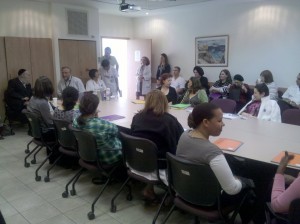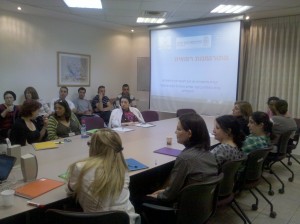First time in Yiddish!! – opening of medical interpreters course in Bikur Holim Hospital
Today we began implementing our cultural competence program at the Bikur Holim hospital in Jerusalem. Bikur Holim is one of the oldest hospitals in the city (founded in 1826). From the article in Wikipedia about the hospital, we have chosen to cite the following:
Situated near the religious neighborhoods of Geula and Mea Shearim, Bikur Holim admits a very high percentage of Haredi Jews, and tries to cater to their needs. Shabbat is strictly observed. Non-Jewish employees record medical information and answer telephones on the Sabbath. Food is warmed in ovens operated by a timer, in keeping with Orthodox religious rulings.
The Haredi (Ultra-Orthodox) orientation of the hospital is very much known in Jerusalem. Yet, it is not surprising to find out that since most of the medical and non-medical staff are non-Haredi, there is still a need for improving cultural competence for Haredi patients and families. When we approached the hospital management, half a year ago, as a part of the program of cultural competence in Jerusalem (a program we share with the Jerusalem Foundation), we were warmly invited in. The staff also emphasized that the hospital accepts patients from all around the city, including high percentage of Palestinians (Muslims and Christians), new immigrants from all around the world and migrant (foreign) workers. Together, We planned a cultural competency program for the hospital.
The first step of the implementation was today – a medical interpretation course for more than 30 bilingual staff members. Well, we did such 30-40 hour training courses before, in Alyn hospital, in Clalit HMO and in Hadassah. But this time, in addition to Arabic, Russian and Amharic interpreters, we have a large group of Yiddish interpreters! Indeed, although most of the Haredi community can speak in Hebrew, many of them are much more used to Yiddish, and Hebrew for them is a kind of a second language. Also, medical terminology and explanations in English or in Hebrew are hard for many of them to understand. We believe that using Yiddish can help many of them and would make them feel more “at home” in a Western hospital.

Bikur Holim Interpretation Course – on the left Rabbi Shlomo Pappenheim, main Eda Haredit Leader and a Board Member of the hospital
Definitely, if this works well, we will advise other medical institutes in Jerusalem, that also serve large Haredi populations, incorporate Yiddish into their list of interpretation languages.
The next step will be providing our staff training workshops of cultural competency. One of the urgent needs is to make Arab patients feel “at home” in a hospital that is seen as oriented towards religious Jews. With the help of the wonderful staff of the hospital, we are sure that this challenge can be met.

